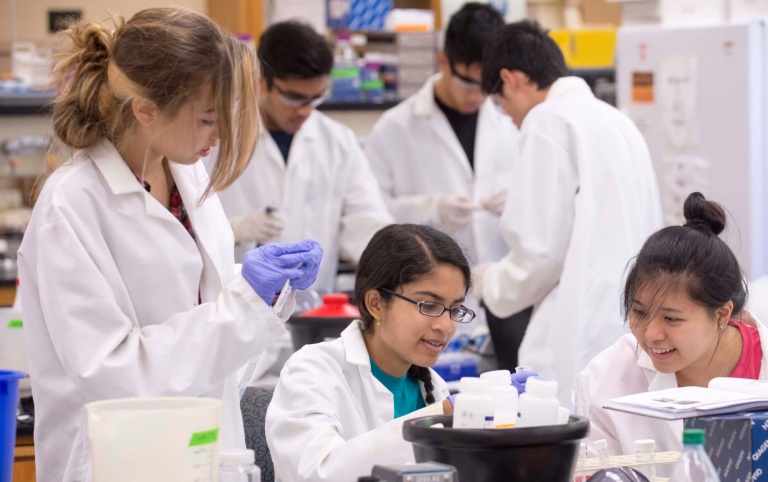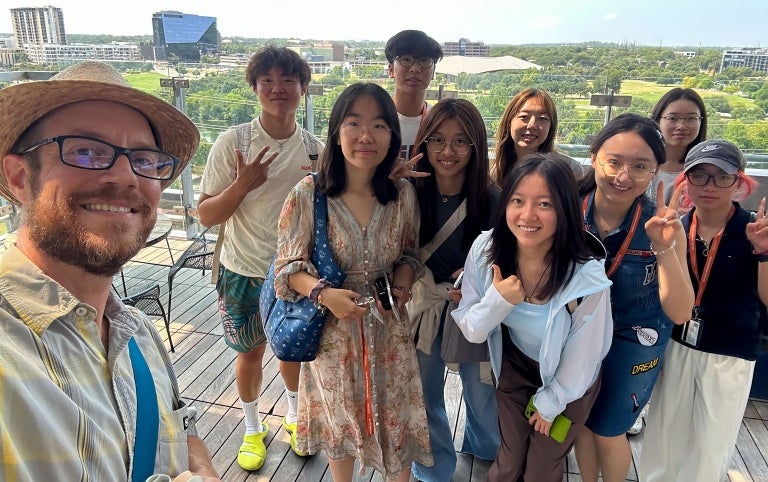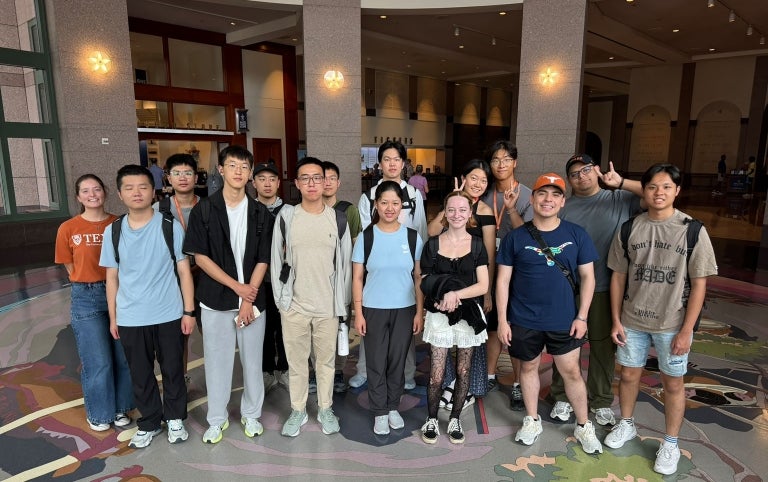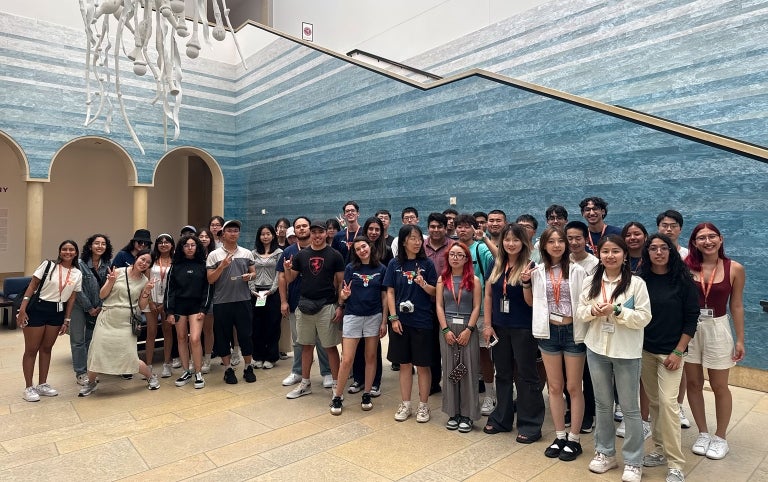Main navigation

Global Summer Institute
Join The University of Texas at Austin for a once-in-a-lifetime opportunity at the Global Summer Institute! You’ll expand your horizons and make new friends with peers from around the world while studying at the No. 1 public university in Texas and No. 9 in the United States. Experiential learning is at the heart of our programs; you’ll take part in exciting excursions across the region, explore the arts, culture, and history of Austin, and deepen your knowledge in your chosen field.
About the Global Summer Institute
Deep in the Heart of Texas
Why Spend Your Summer at UT Austin?
- Gain hands-on, practical experience in your chosen field
- Network with top faculty members and industry experts
- Immerse yourself in U.S. academic language and culture
- Enjoy access to UT Austin’s world-class facilities
- Improve English writing and oral communication skills
Program Highlights
- Interactive classes, five days a week
- Campus tours and field trips to explore Texas
- Instruction on the U.S. university admissions process
- Certificate of completion and grade report
Apply For the Program
- Applicants must be 18 years or older by the start of the program
- Applicants must have at least intermediate level English
Required Documents
Please submit the following for your student visa application so we can issue the form I-20:
- A copy of the photo page of your passport
- A financial guarantee statement (typically, a personal or family bank statement)
Email these documents to us at txglobal-gsi@austin.utexas.edu.
After everything is submitted, please allow 5 business days for application processing and document issuance.
2026 Program Dates
July 13 - August 7, 2026
Housing check in July 11; housing check out August 8
Courses Offered
Choose to enroll in up to two academic content courses taught by UT Austin or visiting international faculty in any of the disciplines listed below. For your third course, add a writing, listening/speaking, or reading/vocabulary class taught by UT Austin’s English Language Center faculty. You must enroll in three classes, and at least one must be an English course.
Course Schedule
| Monday | Tuesday | Wednesday | Thursday | Friday | |
|---|---|---|---|---|---|
| 8:30 - 10:30 a.m. | Class 1 | Class 1 | Class 1 | Class 1 | Class 1 |
| 10:45 a.m. - 12:45 p.m. | Class 2 | Class 2 | Class 2 | Class 2 | Class 2 |
| 2:00 - 4:30 p.m. | Class 3 | Class 3 | Class 3 | Class 3 |
- Business and Accounting
Introduction to Accounting
- The accounting cycle
- Recording journal entries & the closing process
- Classified balance sheet & related disclosures
- Internal controls
- Asset misappropriation project
Principles of Finance
- Operating environment of the firm, financial statements, and financial ratios
- Calculation of different types of financial values, interest rate, and periodic payments
- Relationship between interest rates and asset value and return of investments
- Capital budgeting, elements of working capital management, and the relationship of risk to return
- Basics for making appropriate financial decisions
Fundamentals of Marketing
- Marketplace and consumer behavior
- Customer-driven marketing strategy: creating value for target customers
- Products, services, brands, and their life cycle
- Pricing, marketing, and communication
- Advertising, public relations, and types of sales promotion
- Engineering
Engineering Physics
- Structural analysis and static equilibrium problems
- Applied principles of dynamics
- Analysis of simple circuits to determine their defining characteristics
- Simple experiments to test physical concepts
Engineering Design
- Problem formulation and specification development
- Concept generation and selection
- Product redesign project
- Conceptual design project
- Computer Science
Java Programming
- Java methods, references, variables
- Linux basics
- Object-oriented and network programming
- Unit testing, debugging, and multi-threading
- Java Exception handling and Java graphic libraries
Python Programming
- Practical programming skills and Python proficiency
- Core object-oriented programming
- Efficient code organization
- Hands on-exercises like industry standard coding challenges
- Construct a unique Python game
Introduction to Big Data & Data Mining (prerequisite - basic Python programming)
- Connect data mining to student’s field of study
- AI techniques to practical problems
- Project proposals: choose from improving existing approaches, applying algorithms to new problems, stress testing, or designing new approaches
- Emphasis on creativity by allowing students to mix and match approaches in their project proposals
- Social Sciences & Humanities
Cognition and Human Learning
- Survey of theoretical perspectives of learning and motivation
- Analysis of various behavioral methodologies and human development theories
- Review of multicultural issues: substance abuse/addiction, basic therapeutic skills, and diagnostic information
- Application of interventions and assessments with peers using real life scenarios
Western Culture & Communication Strategies
- Survey of historical and popular culture
- Linguistic and skills strategies for different communication styles
- Familiarity with diverse vernacular accents, dialects, slang, idioms, and history
- Application of primary and secondary research skills
- Experiential field trips and in-class projects
Introduction to Advertising
- Social and ethical issues surrounding advertising
- Criteria used in executing an advertising campaign
- Components of an advertising campaign like strategy and research
- Diversity of people and jobs within advertising
- History of advertising and its effect on modern practices
- Public Health
Public Health and Epidemiology
- Factors for improving health in communities globally
- Field methods - needs assessments, data collection, management, analysis, and visualization; report preparation, and resource identification
- Cultural understanding of a community in health program implementation
- Overview of the basic principles of field epidemiology
- Application of epidemiology methods to basic and clinical science
- English Language (Intermediate and Advanced)
Academic Writing
- Review of sentence types and paragraph organization principles
- Instruction on the transition from paragraph to academic essay
- Overview of the writing process including multiple drafts of an essay
- Practice with the principles of coherence, cohesion, completeness, and unity
- Considerations in research writing
Oral Communication
- Activities for building fluency
- Instruction and feedback on presentation skills
- Pronunciation practice
- Listening and note-taking
- Participation in formal group discussions
Reading, Note-taking, and Vocabulary Development
- Increasing reading speed and accuracy
- Learning to understand meaning from context
- Synthesizing information from multiple texts
- Note-taking skill development
- Vocabulary improvement using the official academic word lists
Program Details
- Program Cost
- Application Fee: $200 early discount if paid by February 28, 2026; $250 for all payments from March 1 onwards. This fee is due at the time of application submission and must be paid before the application will be processed or any immigration documents issued.
- Program Fee: $6,000 (due by June 11, 2026). Program fee is refundable with proof of visa application denial
Program fee includes room and board, tuition and required fees, educational trips, relevant immigration documents (acceptance letter and I-20), required health insurance, final reception, program certificate, and grade report. Rooms are double occupancy in a university dormitory.
Airfare, SEVIS fee, and the visa application fee are NOT covered in the program fee.
- Evaluation & Certificate
Student work will be evaluated according to the grading requirements of each course. A final grade report will be emailed within a week of program completion. Students who pass all classes with A, B, or C grades and have at least 75 percent attendance will receive program certificates.
It is your responsibility to receive approval from your home institution to earn credit for Global Summer Institute courses. We recommend that you work with your international/study abroad office.
- Immigration
For international applicants, once accepted, we will email you a packet that contains a Form I-20 (Certificate of Eligibility for an F-1 student visa). You must then contact your local embassy to begin the student visa application process.








